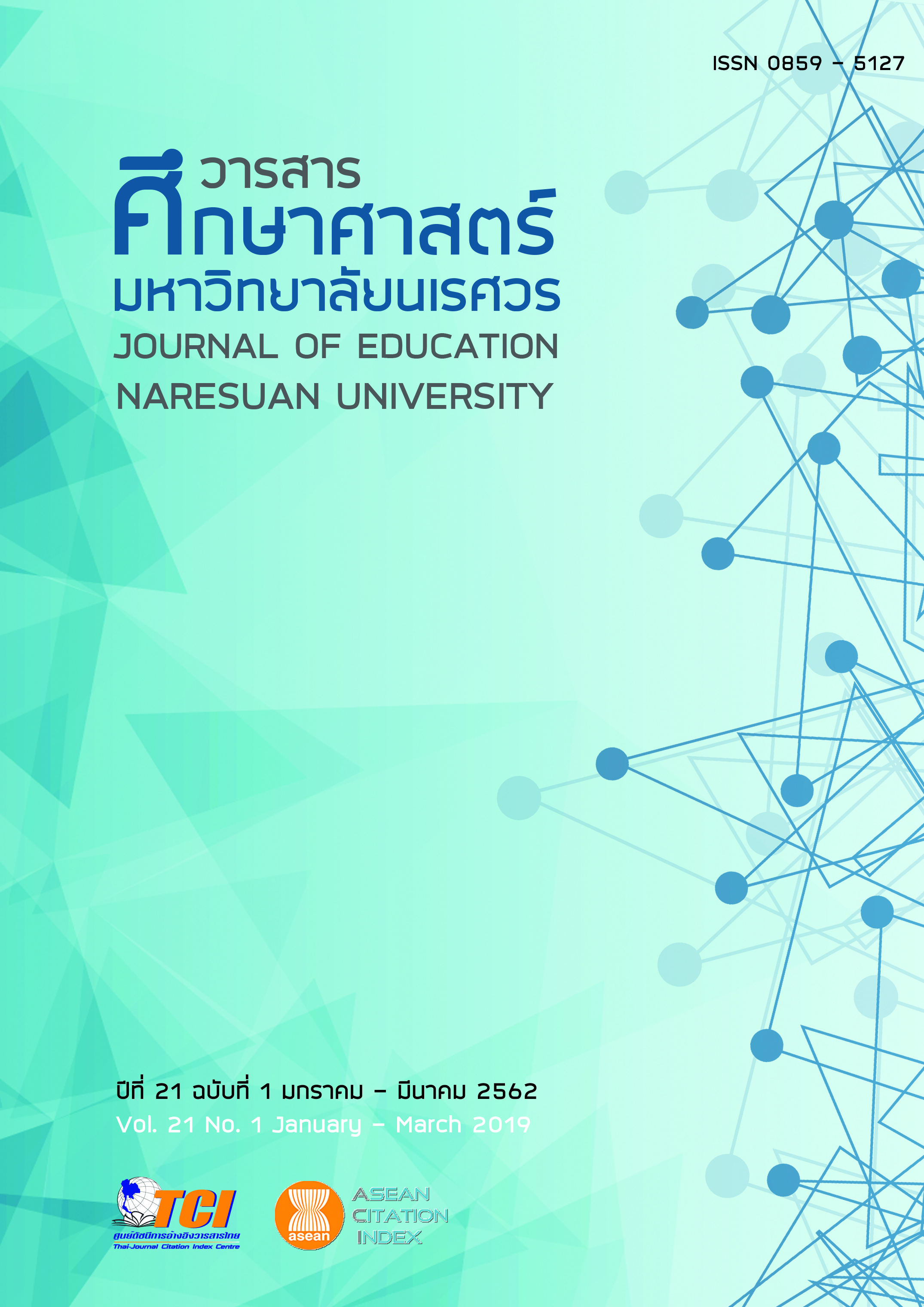การพัฒนารูปแบบการโค้ชเพื่อเสริมสร้างทักษะการสื่อสารด้วยภาษาอังกฤษ ของนิสิตการศึกษาศาสตรบัณฑิต (ครู 5 ปี) มหาวิทยาลัยศรีนครินทรวิโรฒ (A DEVELOPMENT OF COACHING MODEL TO ENHANC ENGLISH COMMUNICATION SKILL OF EDUCATION STUDENTS’ SRINAKHARINWIROT UNIVERSITY)
Main Article Content
Abstract
การวิจัยครั้งนี้มีความมุ่งหมายเพื่อ พัฒนาและศึกษาประสิทธิผลของรูปแบบการโค้ชเพื่อเสริมสร้างทักษะการสื่อสารด้วยภาษาอังกฤษของนิสิตการศึกษาศาสตรบัณฑิต (ครู 5 ปี) มหาวิทยาลัยศรีนครินทรวิโรฒ ด้วยการวิจัยและพัฒนา โดยวิธีดำเนินการวิจัยมี 3 ระยะ กล่าวคือ ระยะที่ 1 ศึกษาวิเคราะห์ข้อมูลจากเอกสาร งานวิจัยต่างๆ และสัมภาษณ์ผู้ทรงคุณวุฒิ ผู้เกี่ยวข้องในด้านการสอนภาษาอังกฤษเพื่อให้ได้องค์ประกอบข้อมูลพื้นฐานและกรอบแนวคิดที่สอดคล้องกับสภาพจริง ระยะที่ 2 สร้างรูปแบบการโค้ชและเครื่องมือประกอบรูปแบบการโค้ชโดยการตรวจสอบความเหมาะสมและความเป็นไปได้ของรูปแบบการโค้ชโดยผู้ทรงคุณวุฒิ และทำการศึกษานำร่องกับนิสิตชั้นปีที่ 2 มหาวิทยาลัยศรีนครินทรวิโรฒ ที่เรียนรายวิชาภาษาอังกฤษเพื่อพัฒนาการเรียนรู้ (ED 201) ภาคเรียนที่ 1 ปีการศึกษา 2558 จำนวน 29 คนระยะที่ 3 ศึกษาประสิทธิผลของรูปแบบการโค้ชที่เสริมสร้างทักษะการสื่อสารด้วยภาษาอังกฤษโดยใช้แบบแผนการทดลอง One group Pretest - Posttest Design เป็นนิสิตชั้นปีที่ 2 มหาวิทยาลัยศรีนครินทรวิโรฒ ที่เรียนรายวิชาภาษาอังกฤษเพื่อพัฒนาการเรียนรู้ (ED 201) ภาคเรียนที่ 2 ปีการศึกษา 2558 จำนวน 30 คน ใช้เวลาในการทดลอง 12 สัปดาห์ๆ ละ 5 คาบ รวมทั้งสิ้น 60 คาบ ทำการวิเคราะห์ข้อมูลด้วยสถิติการวิเคราะห์ความแตกต่างของค่าเฉลี่ย Dependent t-test ผลการวิจัยสรุปได้ดังนี้ รูปแบบการโค้ชที่เสริมสร้างทักษะการสื่อสารด้วยภาษาอังกฤษ ของนิสิตการศึกษาศาสตรบัณฑิต (ครู 5 ปี) มหาวิทยาลัยศรีนคริทรวิโรฒ ประกอบด้วย 5 ขั้น คือ ขั้นที่ 1 ขั้นสร้างความเข้าใจ (Understanding) ขั้นที่ 2 ขั้นวางแผนร่วมกัน (Co- creation) ขั้นที่ 3 ขั้นฝึกฝน (Practicing) ขั้นที่ 4 ขั้นนำเสนอ (Presentation) ขั้นที่ 5 ขั้นให้ข้อมูลย้อนกลับ (Providing Feedback) และพบว่า ค่าเฉลี่ยคะแนนรวมของทักษะการสื่อสารด้วยภาษาอังกฤษทั้งทักษะในการถ่ายทอดข้อมูลเพื่อการสื่อสาร (Productive Skill) และทักษะในการรับข้อมูลเพื่อการสื่อสาร (Receptive Skill) ของนิสิตกลุ่มตัวอย่างหลังทดลองใช้รูปแบบการเรียนรู้สูงกว่าก่อนทดลอง อย่างมีนัยสำคัญทางสถิติที่ระดับ .01 และพบว่า หลังทดลองใช้รูปแบบการโค้ชที่เสริมสร้างทักษะการสื่อสารด้วยภาษาอังกฤษผู้เรียนมีความสุขในการเรียนรู้ภาษาอังกฤษสูงกว่าก่อนทดลองอย่างมีนัยสำคัญทางสถิติที่ระดับ .01
A DEVELOPMENT OF COACHING MODEL TO ENHANC ENGLISH COMMUNICATION SKILL OF EDUCATION STUDENTS’ SRINAKHARINWIROT UNIVERSITY
The purpose of this research were to develop and study the effectiveness of a coaching model for enhancing English communication by research and development. The research procedures consisted of three phases as follows: Phase 1: Studied the basic data, ideas, and theories from literature in order to develop a model enhancing English communication. Phase 2: Developed the coaching model for enhancing English communication. Then, the model was verified by experts and proven by using the model on students. Phase 3: Assessed the effectiveness of the coaching model by employing an experimental design, one group/pretest-posttest. The experimental group consisted of 30 Srinakharinwirot University’s students during the second semester of the 2015 academic year. The students were chosen by purposive sampling. The period of study lasted 12 weeks for 5 hours per week for a total of 60 hours. Data analysis and statistical information was calculated including the mean, standard deviation, dependent t-test, and content analysis. The results of this study revealed that: A coaching model for enhancing English communication of Srinakharinwirot University’s students contained five sequential steps: 1)Understanding, 2)Co-creation, 3)Practicing, 4) Presentation, and 5) Providing Feedback. The effectiveness of the coaching model for enhancing English communication: The average scores of English communication both receptive and productive skills of the group from the pretest to posttest increased at. 01 statistical difference level and the learning with happiness of the experimental group were higher statistically with significance at .01.
Article Details
The owner of the article does not copy or violate any of its copyright. If any copyright infringement occurs or prosecution, in any case, the Editorial Board is not involved in all the rights to the owner of the article to be performed.
References
David P. Diaz, & Ryan B. Cartnal. (1999). Students' learning styles in two classes: Online distance learning and equivalent on-campus. College Teaching, 47(4), 130-135, DOI: 10.1080/87567559909595802
Deborah A. O’Neil, & Magaret M. Hopkins. (2002). The teacher as coach approach. Journal of Management Education, August, 49-64.
Farrow, Tom F. D., & Woodruff, Peter W. R. (2007). Empathy in mental illness. Cambridge: Cambridge University Press.
George Yule. (2014). The study of language (5th ed.). Cambridge: Cambridge University Press.
Joyce, B., & Showers, B. (2002). Student achievement through staff development. Alexandria, VA: Association for Supervision and Curriculum Development.
Karen Ayas. (2011). Project – based learning: Building communities of reflective practitioners. Sage Journals, 32(March), 61-67.
Otto, Sharmer. (2010). U Theory. Washington: National Academies Press
Phyllis C. Blumenfeld, Elliot Soloway, Ronald W. Marx, Joseph S. Krajcik, Mark Guzdial, & Annemarie Palincsar. (1991). Motivating project-based learning: Sustaining the doing, supporting the learning. Educational Psychologist, 26(3-4), 369-398, DOI: 10.1080/00461520.1991.9653139
Salavert, R. (2015). An apprenticeship approach for the 21st century. International Journal of Education Leadership and Management, 3(1), 24-59.
Samakoses, V. (2010, February 4). New generation teachers. Matichon Press, 3. [in Thai]
Semen, B., & Cacioppo. (2009). Mirror neurons. Chicago: Chicago University Press.


